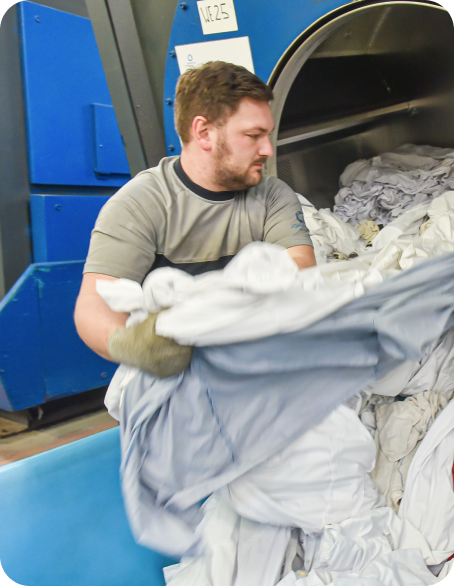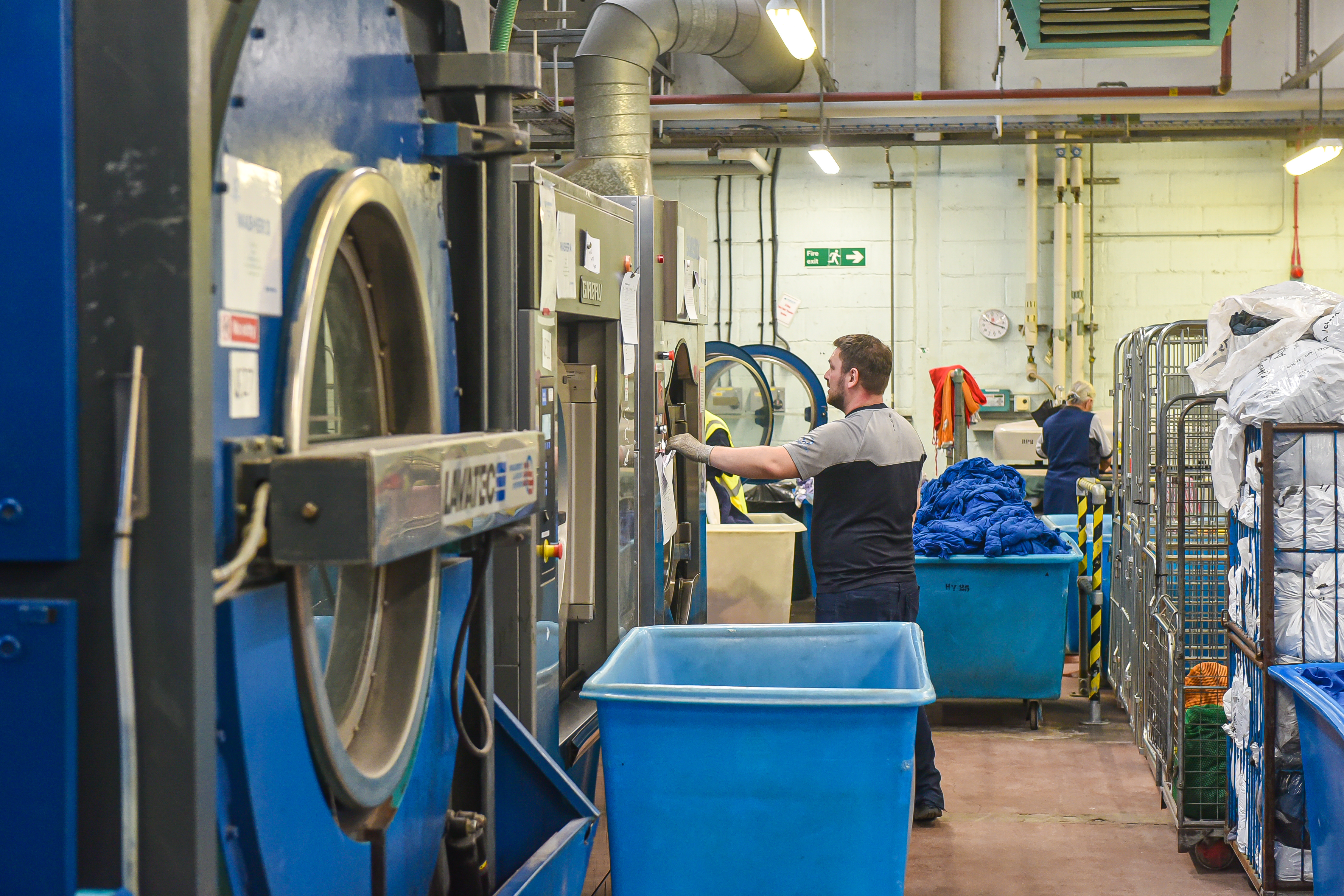In industries where presentation, hygiene and safety matter, clean workwear isn’t just about appearance — it’s about compliance, comfort and confidence. For many businesses, particularly those in automotive, manufacturing, healthcare and food production, the question isn’t whether to clean uniforms, but how to do it.
Key takeaways:
-
Safety & Compliance: Commercial services use industrial methods to preserve protective gear (like Hi-Vis and Flame Retardant) that laundromats can damage.
-
Full Service vs. DIY: Professional services include collection, delivery, repairs, and garment tracking, whereas laundromats offer only basic cleaning.
-
Hygiene Standards: Commercial laundry guarantees sanitization for food and healthcare via thermal disinfection; laundromats use shared machines that risk cross-contamination.
-
Cost & Eco-Efficiency: Managed services provide predictable pricing and use industrial-scale water and heat recycling, making them cheaper and greener than per-load washing.
So the question is: Should you rely on a traditional laundromat? Or are commercial laundry services the better option for consistent, compliant results?
Let’s break down the key differences and why more businesses are making the switch to professional, managed laundry solutions.
What are commercial laundry services?
Commercial laundry services are large-scale, professionally managed operations that handle the cleaning, inspection, repair and delivery of workwear, uniforms and PPE for businesses.
They’re designed for volume, efficiency and regulatory compliance, often serving multiple sites or large workforces.
Unlike a laundromat, where individuals drop off garments for a simple wash-and-dry, commercial laundry providers like Johnsons Workwear offer a complete service cycle, including:
- Scheduled collection and delivery.
- Industrial laundering with temperature-controlled washing.
- Garment inspection, repair and replacement.
- Tracking systems for full garment visibility.
- Compliance assurance for health, safety and hygiene standards.
This makes commercial laundry services ideal for businesses where uniform cleanliness isn’t just expected, it’s required.
Traditional laundromats: A quick overview
A traditional laundromat (or domestic laundry provider) is built for consumer use, offering self-service machines or small-scale cleaning for personal garments.
While laundromats can be convenient for small loads, they’re not designed for the volume, durability or compliance requirements that industries like transport, engineering or healthcare demand.
Typical laundromat features:
- Drop-off and self-service washing.
- Domestic-grade detergents and water temperatures.
- No garment tracking or repair.
- No certification of hygiene or contamination control.
- Not compliant with PPE maintenance regulations.
In short, laundromats serve the public — not professional industries bound by regulation or reputation.
Key differences between commercial laundry services and laundromats
Let’s look at how the two options compare across six key areas:
|
Factor |
Commercial laundry services |
Traditional laundromats |
|
Scale |
Handles large volumes of uniforms and PPE across multiple sites. |
Suited for small personal loads. |
|
Compliance |
Meets health & safety standards like PPE at Work Regulations. |
No compliance verification. |
|
Process control |
Industrial-grade cleaning, inspection and tracking. |
Manual or self-service with limited quality control. |
|
Repair & replacement |
Automatically repairs or replaces damaged garments. |
No repair or maintenance options. |
|
Environmental impact |
Uses water- and energy-efficient systems with wastewater treatment. |
Domestic cycles with higher per-garment energy use. |
|
Cost efficiency |
Predictable, contract-based pricing. |
Pay-per-use, higher cost per wash for volume. |
Why compliance matters
If your business uses specialist workwear or PPE, compliance with standards like EN ISO 20471 (hi-vis) or EN 11612 (flame resistance) isn’t optional. It’s the law.
These garments require specific laundering methods to preserve protective coatings, reflectivity and performance.
A domestic wash or laundromat cycle can degrade these properties, leaving staff unprotected and employers at risk of non-compliance.
For example:
- Flame-resistant garments lose protection when washed with standard detergent.
- Hi-vis tape can fade or detach at incorrect temperatures.
- Oil and grease residues can remain if not laundered industrially, increasing fire hazards.
Commercial laundry providers like Johnsons Workwear use controlled washing conditions, detergents and inspection protocols designed to maintain certification and extend garment life — ensuring compliance and safety at every step.
Hygiene and contamination control
For industries like automotive repair, food processing and healthcare, hygiene goes beyond clean appearances. Contaminated clothing can spread dirt, oil or even harmful bacteria, putting staff and products at risk.
Commercial laundries use:
- High-temperature, programmable wash systems.
- Barrier washes to prevent cross-contamination.
- Detergents formulated for industrial soils.
- Batch segregation to avoid mixing garments from different clients.
In contrast, traditional laundromats:
- Mix garments from multiple users.
- Use shared machines without contamination barriers.
- Offer no hygiene verification or reporting.
Environmental sustainability
Sustainability is now a business imperative. While laundromats tend to use domestic-grade systems with higher per-load resource consumption, commercial laundry services have made major strides in environmental efficiency.
Providers like Johnsons Workwear integrate:
- Water recycling and heat recovery systems.
- Energy-efficient industrial washers.
- Bulk detergent dispensing for precise dosing.
- Garment reuse and recycling programs.
These measures drastically reduce energy consumption and extend garment life, supporting corporate sustainability and ESG goals.
Efficiency and convenience
When managing multiple sites, depots or workshops, logistics matter as much as laundry. Commercial laundry providers operate nationwide collection and delivery routes, ensuring every employee has clean, compliant garments on time.
This eliminates:
- Manual laundering or distribution.
- Lost garments or tracking errors.
- Downtime due to unwashed or damaged uniforms.
In contrast, laundromats place responsibility on the individual employee, leading to inconsistencies and compliance risks.
For larger teams, outsourcing to a professional provider removes a major administrative burden — freeing up time for safety, operations and customer service.
Cost-effectiveness over time
While laundromats appear cheaper per wash, they lack the efficiencies of scale, durability and maintenance that rental-based commercial laundry services offer.
A fully managed service spreads costs across the entire uniform lifecycle, covering:
- Purchase and fitting.
- Laundering and logistics.
- Repairs and replacements.
- End-of-life recycling.
This creates predictable, consolidated costs with no hidden fees or wasted downtime.
Industries that benefit most
Commercial laundry services are particularly valuable for sectors where safety, consistency and compliance are non-negotiable:
- Construction and utilities.
- Public transport, road and rail.
Each of these industries requires workwear that meets performance and hygiene standards — something traditional laundromats simply can’t guarantee.
Why choose Johnsons Workwear
With over 200 years of experience, Johnsons Workwear delivers fully managed commercial laundry services that combine compliance, sustainability and reliability.
Our service includes:
- Personalised garment fitting and branding.
- Scheduled laundering and delivery.
- Certified PPE maintenance and compliance tracking.
- Automated repair and replacement programs.
- Environmentally responsible laundering and disposal.
Whether you operate a single depot or a national network, we ensure your workforce stays protected, professional and ready for the job.
While traditional laundromats may suit personal clothing, commercial laundry services are built for professional performance. They offer certified cleaning, logistical reliability and regulatory peace of mind — keeping your business safe, efficient, and sustainable.
If you’re ready to simplify workwear management, reduce admin and guarantee compliance for your teams, it’s time to explore a smarter solution.





.jpeg)